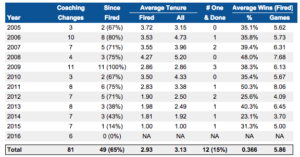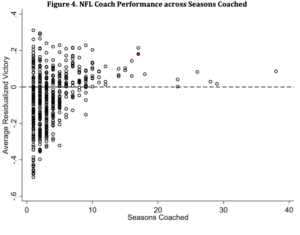Is Rivera the Guy? A Look at Twenty Years of NFL Head Coach Hires
April 7, 2020
by Sean Conte
When a team struggles, the coach’s head rolls first.
It’s become such an expected move after a poor season that we have nicknames for the Monday after week 16, the day on which most coaches and GMs are fired. But is this a sound strategy? Does firing a coach typically lead to more success? And for a team like the Redskins, how likely is it that we’ve finally found The Guy? Let’s take those questions one at a time.
Is firing the head coach a sound strategy for improvement? Sure, but not in the ways you’d think. Take this study, from a pair of University of Chicago professors. Their findings, based on analysis from 1922 – 2016, shows that NFL coaches “explain about 20-30 percent of the variation in a team’s success” across a range of metrics, most directly in “fumbles per game [and] penalties committed per game.” That’s good, because every turnover is critical in the NFL. Interestingly, coaching changes don’t seem to affect pass-run ratios at all, perhaps because of in-game situational constraints, and have a much smaller impact on points scored. Distressingly, they find the effect of coaching changes on team victories to be “not statistically significant.”
Hold it right there. That can’t be true, can it? Turns out, it can. Berry and Fowler aren’t the only two to make this finding. Taking a look at all 75 head coaching hires made between 2005 – 2015, The Cauldron’s Donovan Rose found that less than half ended up with a better win percentage than their predecessors, 65% were themselves canned within an average of 3 years, and a whopping 16% were one-and-done firings.

Taking a step back and looking at the last twenty years – coincidentally, the exact length of ol’ Bill “The Outlier” Belichick’s tenure in New England – the trend continues with magical symmetry. 138 head coaching changes were made in that time (by everyone except the Patriots) and only 34% remained employed for 3+ years and had a positive win/loss ratio. 66% were, by that criteria, unsuccessful.
How can there be such a disconnect between coaching and success?
Because football is the ultimate sport of context, of course. Player performance is tied to that player’s teammates. The draft, by design, awards teams unevenly. There’s no reliable way to account for the injury of a star player, the impact of a salary cap penalty, or the presence of a meddling owner, when assessing a coach’s performance in any given year. The rule book gets longer every season, and we are forced to view the same talent, strategies, and gameplans through new lenses. Put simply, no coach exists in a vacuum. Plus, it’s an elite job, and most will not have success at it.

The best – and worst – head coaching records in NFL history are reserved for those with the shortest tenures, and they tend to muddy up the statistics. No one has the luxury of performing poorly and keeping their job, but unfortunately, the longer you stand in the ring, the more punches you take, and the further you stray from perfection. It’s a bit of a Catch-22.
In the NFL, everything but the most obvious statistics can be misleading. The best coaches in the league – whether they’re HOF quality or not – are the ones that managed to last as head coaches for longer than three years with a cumulative win ratio on the good side of .500. By that criteria, Ron Rivera is one of the better coaches around, and the Redskins have made a sound decision in hiring him. Just don’t expect the points or wins to come right away. Or to be delivered solely on his back.
